Tim Don – Ironman record smasher
Last weekend the 2006 ITU Olympic distance World Champion and 2014 Ironman 70.3 World Championship bronze medalist added another jewel to his résumé. With his 7:40:23 winning time at the Ironman South American Championship, 39-year-old Don broke his own Ironman personal best by 24 minutes and the year-old Ironman brand world record by 4 minutes.
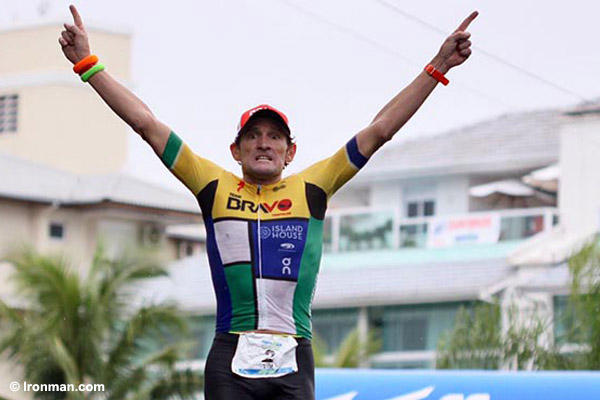
After his sizzling performance, Don said he feels pretty good after a few sessions in NormaTec recovery boots, an easy 45-minute bike ride and a no-wetsuit 2 kilometer open water swim designed let the cold water reduce that achy feeling. He spoke to Slowtwitch via cell phone.
Slowtwitch: What were you aiming at this weekend?
Tim Don: I wanted to be competitive against a tough field. I wanted to be aggressive on the swim and the bike. Especially for the first 90 minutes of the bike. I came here to race for the win and the world record was just a bonus. I did not expect that at all.
ST: When did you know this was a special day for you?
Tim: Halfway on the bike someone gave me a split on the chase group [10 minutes lead at 90k] and I realized there that this was a big day. Reinaldo Colucci and Igor Amorelli of Brazil were closest and were playing a tactical game behind me. That played into my game because I was able to get my head down and just ride.
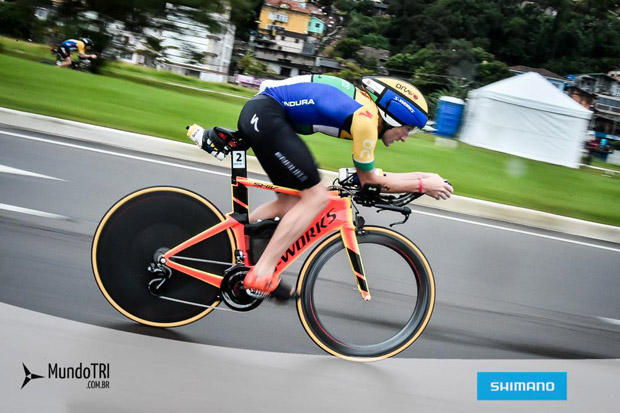
ST: What conditions helped you post a fast bike?
Tim: The course is 100 percent closed to traffic. You are on the right side of the road but near the center lane. So there are cars going past on the right and they create a wake that adds to your momentum. And the roads are very straight so you can spend 90 to 95 percent of the time on your aero bars.
ST: Did the light rain and cool weather help?
Tim: Massively. There was no wind. The sea was so calm. It was a slight drizzle and it was just less than 20 degrees centigrade on the run. I think the fact that 3 women were under 9 hours and one broke the course record goes to show it was a very fast day across the board.
ST: You could have played a tactical game and cruised to an easy victory but you kept on the throttle. Were you racing for the record?
Tim: I was definitely racing to win. Just after 10k of the run, some of my guys on Team Bravo said “You can go for the record.”
I said, “What record?” They said, “the world record!” “Really?” They said, “if you can run a 2:48 you will be close to the record.”
At that stage I wasn’t focusing on the record because last year I was injured leading up to the race and I was struggling the last 10 kilometers. So this year I was focused on small things. ‘Get to the special needs. Get my nutrition. Don’t go too fast too early. Stay hydrated.’ Even when I had 3 kilometers to go, people kept saying “Keep going. You’re close to the record.” In my mind I didn't know what ‘close to the record’ meant. Are you 10 seconds behind it? Are you 10 seconds ahead? Are you a minute behind? Are you a minute ahead?
ST: Did you ask yourself, “Why am I pushing so hard with such a big lead?”
Tim: No. I had not yet showed my potential in an Ironman so I really wanted to race as close to my limit as possible. After this race I knew I would have a long break with a lot of time to my next big race. So I really wanted to keep the pressure on and keep pressing. My best time in an Ironman run was a 2:50 here at Brazil and 2:52 at Mallorca. I wanted to get under 2:48 – 4 minutes per kilometer pace. [Don ran 2:44.]
ST: Did you have a clear idea how fast you were going?
Tim: At the finish, they don't have the race clock facing you. It faces the media. I did not know if I was going to just miss the record or just make it. That’s why I didn’t high five anyone and I gave it 100 percent until I crossed the line. When I crossed the line and turned around, I saw it: 7:40!
PREPARATIONS
ST: You had only done four Ironman races. Any notable performances?
Tim: Yes and no. In terms of me – yes. In terms of results – what everyone else measures you by – no. I won 2014 Mallorca my very first one. Then I went to Kona and finished 15th. Not great. I walked for a lot on the run.
ST: Why?
Tim: I had stomach issues. I had to visit the Porta-Loos four or five times and could not take in any calories. I also had a five minute penalty for cutting in on the bike. I came to Brazil last year and got second. I was very happy. It was the fastest Ironman I had done – 8 hours 4 minutes 15 seconds. And then I got severe cramps in my legs on the bike and DNF’d Kona last year.
ST: I think if you had an incident-free race in 2015, you might have been top 5 at Kona.
Tim: It would be a stretch. But that is the beauty and the allure of Ironman. You can be in amazing shape and have an amazing résumé. But it is tough to get it right. Brent McMahon went 7:46 on this course last year. This year he had a broken hand a couple of months ago and fell ill earlier in the week. So many things can happen leading up to and during the race. Lots of the guys in Brazil were heavy hitters – Andreas Raelert, Eneko Llanos – but they had off days. Ironman can be a cruel beast. If things go wrong hopefully you can learn from it. .
ST: What was different about your preparations for Ironman Brazil this year?
Tim: I live in Boulder 90 percent of the time. This winter I went to Tucson for two weeks and stayed with Lisa Roberts and her husband John. Apart from that, I've been in Boulder for the whole winter. Julie Dibens has been my coach and oversees the daily running of my program. I also started working with a British guy called Matt Bottrill – a bike and time trial specialist.
ST: How does that work?
Tim: I think they are both learning from each other. Obviously Matt comes from a specific bike background. And Julie is an Olympian, a world champion and a Kona podium finisher. Their résumés are fantastic. I am lucky to have both of them as my coaches. Julie communicates with Matt on a weekly basis. He puts in the bike sections and they figure out the synergy of the week so we are getting the best out of the swimming, biking and running. I download all my data and so forth and they come up with my training program together.
ST: What was most important in your recent improvement?
Tim: Matt’s input was very important on my equipment, pacing, race tactics and my confidence. He takes a very holistic approach to the time trial. And I think the training is harder and more specific. This was the first real Ironman I have prepared for in its entirety. In the past I have always prepared for the World 70.3s and then hoped to race well at Kona. This year for the last four months my sole focus has been on this race. So at St. George [which Don won in 2015] I didn’t have my best race because I wasn't fresh. But we were looking at the bigger picture. I was really happy I finished 4th because I was training specifically for Brazil.
ST: Your size does not match most men’s Kona winners and top triathlon cyclists. You are 143 pounds and many Ironman champs have been taller and 20 to 30 pounds heavier. How did you go so fast at Brazil?
Tim: I am a lot smaller so the hole I am pushing through the air is a lot smaller. So my numbers don’t need to be as high as those guys to go as fast. Matt instilled confidence from my numbers and in the training sessions I have done. Also, lots of athletes put their data on line so he can look at their data in races. Obviously he makes an educated guess on their weight and can work out their watts per kilo. And from that, he learns what I need to be competitive.
ST: So how does he calculate the watts you need to put out?
Tim: The target for a competitive Ironman is about 4 watts per kilogram. I weigh 63.5 kilograms (143 pounds) so my target is about 254 watts, significantly less than the bigger guys. .
LOOKING FORWARD
ST: Now you are among the top Ironman runners – you broke 2:45.
Tim: Having run a 28 minute 10k and a 3:46 1500, that's where I should be. But I had never done that in a race. That was my goal.
ST: Your 7:40:23 puts you second of everyone who has ever done an Ironman distance race. Where does this put you at Kona?
Tim: Runners on the track can compare themselves to the world record holder with some accuracy. But Ironman is a bit like cross country. The variability of courses and conditions is massive. Some courses are long. Some are short. The first Ironman I did at Mallorca, they told us the bike was 183 kilometers. I can say I will be competitive and Brazil definitely gave me confidence going into Kona. I am very proud to go 7:40. But I am not going to rest on my laurels. Once I get back from a family holiday to the Bahamas, Julie and Matt and I will go over the race and find things we can work on in training and start the buildup again.
ST: What is the hallmark of an Ironman champion?
Tim: The sign of a great athlete is being consistent. Look at Jan [Frodeno], Sebi [Kienle], Rinny [Carfrae] and Chrissie Wellington. They are not one hit wonders. I want to be like them. I want to use this to be a stepping stone to be one of the most consistent Ironman guys in the world. I definitely think I am one of the top 70.3 athletes. But it’s going to take a lot of hard work to stamp my name as one of the top 10 Ironman athletes in the world.
ST: What is different about the current tactics at Kona?
Tim: There are more surges – a little like the 10,000 meters final at the Olympics. I wouldn’t say it is becoming a tactical race, but Jürgen Zäck, Normann Stadler, Dave Scott, Mark Allen, Thomas Hellriegel – those guys rode steady. Now you can't afford that. When Freddy Van Lierde or Marino Vanhoenacker decides to put the hammer down, do you go with him? Maybe not. But when Tyler goes with him, and Jan, and Potts?
ST: Once you have 4 or 5 guys making a break you have to respond?
Tim: Exactly. So you change your training accordingly so it is not all steady state. It is fantastic that all these athletes put their data on Strava. Now we can look at not just power to weight. But how they ride 180 kilometers and where they surge. Matt can work out when there is a trend of this happening. So we design sessions to adapt.
ST: Will you skip the 70.3 Worlds this year to focus on Kona?
Tim: At the moment I am 90 percent sure I will be racing in Chattanooga. Obviously the last two years the Ironman 70.3 Worlds involved a lot of travel. But I definitely want to do it. It worked out well that I raced St. George before Brazil. So it will serve as practice for Kona so to speak.
ST: Have you been seriously discouraged in you first two visits to Kona?
Tim: Yes and no. It is tough, Ironman. You can come up with a thousand reasons why you have a good race – and a bad race. But I am all in for Kona. It might be arrogant to say I am going there to try to win it. Bottom line I would love to get a top 10 and if I have a great race – top 5 maybe. But Kona is a different beast. The tactics. Such a top heavy field. Obviously the conditions are unique with the wind, the humidity, the heat, the course. So I am under no illusions. Brazil doesn’t equate to a podium at Kona at all. So, I am willing to the do the hard yards between now and then and I am confident I can be competitive on race day.
ST: You’re two years older than when Mark Allen retired. Can you win Kona?
Tim: Craig Alexander was 38 when he won his third Kona. First of all the body needs to be healthy and injury free. On top of that you still need to be hungry for success. You need to be hungry for your commitment to the training. I am so lucky that my wife supports me 110 percent. And my mum has been living with us for the last five weeks. She helps with the children so I can prepare and get a little extra rest.


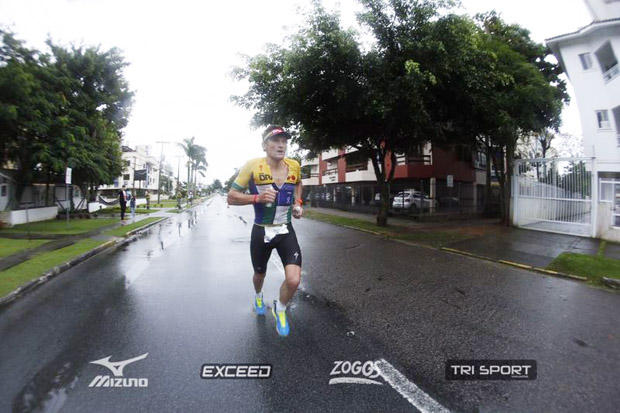
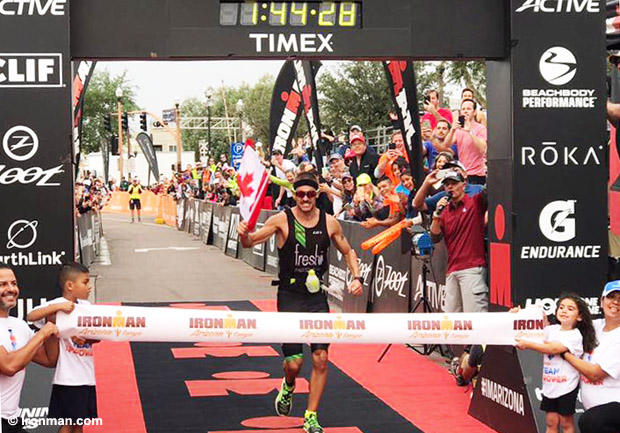
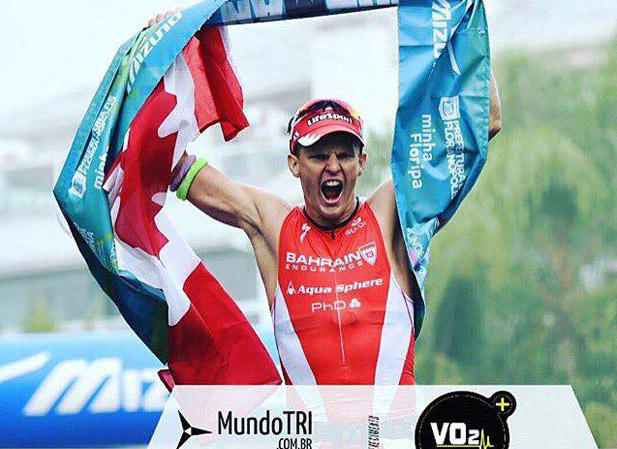
Start the discussion at slowtwitch.northend.network